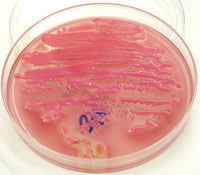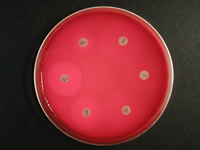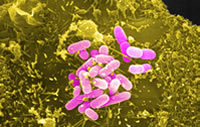- Citas Centro Médico de Caracas: Lunes, Miercoles y Viernes. Pulse el botón Agende una Cita
- Sistema de citas en linea exclusivo para Centro Medico de Caracas en San Bernardino
- Citas CMDLT: Jueves. llamar al 0212-9496243 y 9496245
- Las Emergencias son atendidas en CMDLT previa coordinacion personal al 04142708338
- Proveedor Seguros Mercantil y Sudeban

The urinary infection in the pregnant woman is relatively common and in most of the cases it is not associated to complications, but hidden and left to its free evolution can lead to serious problems for the mother and the fetus. The urinary infection par excellence in pregnancy is asymptomatic and can lead to complications, asymptomatic bacteriuria, the most frequent, acute cystitis, relatively rare and the most feared, acute pyelonephritis.
I Asymptomatic bacteriuria
Asymptomatic bacteriuria involves the emission of bacteria in the urine, usually sterile, without symptoms of urinary infection. Technically speaking, it is defined as a positive urinary culture (presence of more than 100,000 Colony Forming Units -UFC- per milliliter of urine) in the absence of symptoms of urinary infection.
How does it manifest?
There are no symptoms, so it is called asymptomatic
We diagnose it because we look for it. As we know that 2-7% of women, pregnant or not suffering from BA, we have the obligation to practice occasional urine cultures in non-pregnant women and routinely to all pregnant women at their first prenatal visit.
What is the importance of BA in pregnancy?
In pregnancy there is congestion of the urinary tract, obstruction by the pregnant uterus, decreased urethral and bladder tone and decrease in cellular immunity so that certain infections can get out of control of the natural immune mechanisms of the woman and endanger her lifetime; the most notable case is that of asymptomatic bacteriuria. Without diagnosis and appropriate treatment 25-30% of patients with BA will develop an acute cystitis or a renal infection (acute pyelonephritis) that can trigger a generalized infection (sepsis, 2% of cases) and take the patient to intensive therapy or death.
As for the baby, BA and its complications can generate premature births and low birth weight babies.
Which is the treatment?
The treatment is based on the use of appropriate antibiotics guided by the result of the Urine culture and the Antibiogram. Once the treatment is finished we make another culture of urine to verify that the urine is, again, sterile
If pyelonephritis occurs, it is possible that the patient must be hospitalized to receive intravenous treatment for at least 72 hours. Once the treatment is finished (it is completed orally at home) a control uroculture is performed to ensure that the urine is sterile but the patient will receive antibiotic treatment at low doses (suppression therapy) until the end of pregnancy as it has been demonstrated that patients who have suffered acute pyelonephritis during pregnancy have a high risk of suffering it again
What I can do?
- Go early to your prenatal care
- Have an adequate ano-genital toilet and avoid cleaning the anus from back to front after defecating
- Avoid anal intercourse or at least avoid vaginal intercourse after anal if there is no previous washing of the penis or use and removal of a condom
- Notify the obstetrician about the presence of fever, malaise, low back pain and urinary symptoms such as burning, frequent urination to urinate, change the smell of urine, etc. What should not be done Not controlling your pregnancy is the first step to an obstetric complication
Recovery time
In asymptomatic BA there is no disease as such, so there is no talk of recovery. The important thing is to comply with the prescribed antibiotic treatment and maintain it throughout pregnancy if indicated. The recovery of pyelonephritis during pregnancy takes about 3-4 days, however the anemia that accompanies it can take weeks to be corrected.
Avoid pyelonephritis and its complications during pregnancy, go early to your prenatal checkup and request a urine culture if your doctor has not discussed the issue.
II Acute pyelonephritis: the complication of Bacteriuria
Pyelonephritis is a form of urinary infection of the upper tract, kidney and renal pelvis, very symptomatic in most cases and accompanied by pain in the middle part of the back (lumbar fossa), fever and chills. It is called acute pyelonephritis when the symptoms appear quickly and the patient manifests many symptoms, usually 1-2 days of evolution.
It is suggested that most cases of pyelonephritis are due to a low urinary tract ascending to the kidneys (for example, inadequately treated cystitis). Asymptomatic bacteriuria is a recently considered condition in which there is assumed to be an asymptomatic “chronic” infection or colonization of the kidney that can lead to pyelonephritis or irreversible chronic damage of the kidneys. This is particularly dangerous during pregnancy since infections of this type can lead to premature delivery and infections of the fetus or its attachments.
Patients susceptible to pyelonephritis are those with lesions or malformations of the urinary tract, recurrent urinary tract infections, carriers of urinary stones, chronic diseases such as diabetes, debilitating diseases such as immunosuppression syndromes (eg AIDS), pregnancy, etc
What are the symptoms of acute pyelonephritis?
- Low back pain, especially on the right side (more frequent than the left)
- Chills and fever
- Abdominal pain
- Nausea and vomiting
- Some people manifest or have a history of low urinary tract symptoms: frequent urination, urination persists after urination is finished, pain when urinating, etc.
How is it diagnosed?
The clinical characteristics of pyelonephritis are clear enough to make an accurate diagnosis; however, there are times when the clinician may be confused by the lack of signs or symptoms or the atypical presentation of the disease. If there is suspicion, a urine test, a urine culture and a blood laboratory routine should be done. If other urinary tract injuries are suspected, a urologist should be consulted.
III Cystitis
Cystitis is inflammation of the urinary bladder, usually associated with a bacterial infection of the urine. With some regularity, cystitis may occur as a consequence of an asymptomatic renal infection (asymptomatic bacteriuria) and its lack of treatment can generate acute pyelonephritis. The most frequent causative agent is Escherichia Coli.
Symptoms
- Pain or burning sensation when urinating: dysuria
- Frequent and urgent need for urine: frequency
- Sensation of desire to urinate when finished urinating: tenesmus bladder
- Pain in the lower abdomen
- Bad smell of urine
- Presence of blood in the urine: hemorrhagic cystitis
- Pregnancy increases the urinary frequency so it generates doubts of urinary infection in many patients, but in this case there is no burning or voiding pain.
Diagnosis
The diagnosis of BA can only be made through the use of cultures (urine culture) for the identification of the germ.
Bacterial colonies in urine culture, positive.

Biochemical tests to determine the identity of the germ.

and its resistance to antibiotics (antibiogram)

Bacteria are growing on the entire surface of this container but do not approach paper circles impregnated with antibiotics. The larger the areola around the paper circle, the greater the effectiveness of the antibiotic. In this way we know what antibiotic we should use in infections. This result requires 3 to 4 days
The bacteria involved in more than 90% of urinary tract infections is Escherichia coli .

Acute pyelonephritis
- During pregnancy it can be a serious infection.
- It is manifested by low back pain (the right kidney is affected more frequently), fever, chills, malaise, dehydration, nausea and vomiting.
- It may require hospitalization.
- It can be repeated (2%) so the patient must take antibiotics at low doses during the rest of the pregnancy (suppressive therapy).
- Its complications are maternal sepsis, anemia, dehydration, premature birth, fetal growth retardation, etc.
- Pyelonephritis outside pregnancy is managed as any mild to moderate infection, on an outpatient basis and the risks of complications are quite low.
